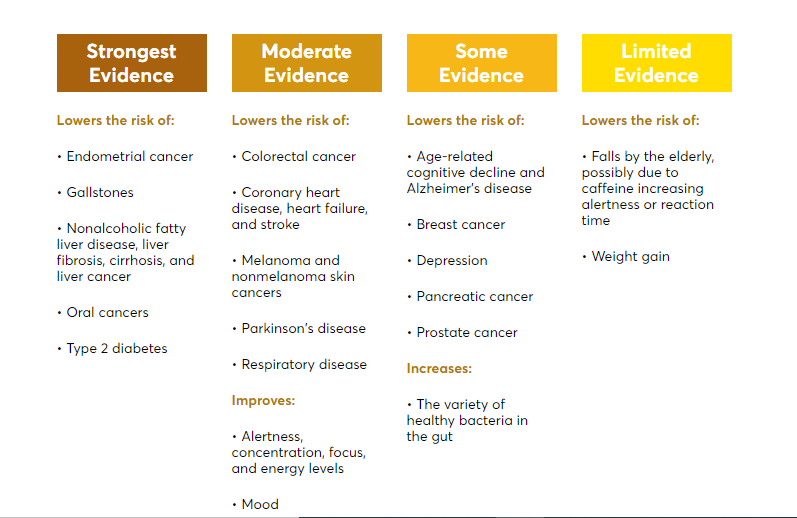The Whole-Body Benefits of Coffee

Go ahead—drink to your health!
By Jennifer Cook September 26, 2019 | Source: Consumer Reports
“The most important thing we’ve learned about coffee over the past 20 years is that there’s very little indication that it’s bad for you,” says Edward Giovannucci, M.D., a professor of epidemiology and nutrition at the Harvard T.H. Chan School of Public Health. “If anything, there’s more evidence that it may be healthy to drink.”
The benefits are probably due to anti-inflammatories and antioxidants found naturally in coffee: polyphenols (such as chlorogenic and quinic acids) and diterpenes (such as cafestol and kahweol). It’s likely that many of coffee’s health perks extend to decaf, too, because with decaf, only the caffeine, not these other compounds, is removed.
Studies have found that coffee has a positive effect on the risk of a variety of conditions and diseases, including brain health and weight control. But not all of the benefits have the same strength of evidence behind them. (See the table below.) Of course, adding loads of cream and sugar to your coffee may offset some of the benefits you get from it.
In general, people can safely consume up to 400 mg of caffeine per day, the amount in two to four 8-ounce cups of coffee. For some, too much coffee irritates the stomach, causes anxiety or the jitters, disrupts sleep, and increases the frequency of heart palpitations. Three or more cups per day appears to trigger migraines in people prone to them. And pregnant women, people who are at risk of osteoporosis, and those taking certain drugs (including some antibiotics, antidepressants, and antipsychotics) should limit their intake of caffeinated coffee.
Check out the recommended coffee makers from Consumer Reports’ tests below.
Coffee Claims Edward Giovannucci, M.D., of the Harvard T.H. Chan School of Public Health, weighs in on where the current research is solid and where more investigation is needed.

